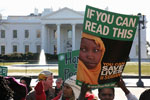
If there was any doubt in your mind, recent developments probably seal the deal: The so-called Save Darfur movement seems to top the list of favorite advocacy efforts to lampoon. In the span of just a week we’ve heard buzz about the new book Saving Darfur by journalist Rob Crilly, which argues that the work of Darfur activists is “leading us to the wrong solutions,” and a post on Change.org’s War and Peace blog suggesting that the movement’s activities amount to “shouting.”
Sidney Traynham of War and Peace notes that the two Save Darfur rallies he attended were in 2006 –- after which he concluded that "I would not attend another" – and he goes on to assess the movement based on his experiences of four years ago. Needless to say the situation in Sudan has massively changed, and Darfur activists’ efforts have evolved, too.
As someone who was both an early adherent to the movement as a college student and who currently works for a prominent advocacy group in this space, I would encourage critics to take look at what Sudan advocacy is currently doing.
Let’s start out with the connotation of the movement’s name. Of course, in the mainstream media, the term Save Darfur is still widely used as a catch-all, but people with a more intimate knowledge of the advocacy effort should pick up on the fact that, more or less movement-wide, there has been a conscious shift toward speaking of an all-Sudan solution.
Through a few years of experience, and with guidance from academics and policy makers with long-standing and firsthand knowledge of Sudan, many U.S.-based activists now acknowledge the fact that while the government’s campaign in Darfur was particularly deadly, its motives there weren’t unique. Khartoum’s hand may be disguised as a janjaweed militia, the Lord’s Resistance Army, or a southern Sudanese rebel faction, but the end goal is the same. After more than two decades in power, the ruling National Congress Party has tested and perfected a strategy to destabilize large swaths of the country in order to consolidate power in Khartoum. As a result, the most prominent advocacy organizations focusing on Sudan today emphasize the importance of tackling this deadly pattern of marginalization throughout the country, focusing on critical, tangible milestones like the upcoming elections and ongoing negotiations over the North-South peace deal. (Of course, in the interest of space, I’ve summarized a position that my colleagues and I at Enough feel is central to the understanding of Sudan’s multiple conflicts; for more nuance, including references to the various players other than the NCP who are obstructing peace in Sudan, read some of our strategy papers.)
Importantly, Darfuris, and Sudanese in general, are quite supportive of advocacy efforts in the United States and elsewhere. Most advocacy organizations work in genuine partnership with Sudanese and view local empowerment as a cornerstone of their efforts.
Click here to continue reading.
Photo: Activists gather at the White House as part of the Sudan365 campaign (Courtesy of the Save Darfur Coalition)
This post is part of a new series that will appear every Thursday on Change.org’s Stop Genocide blog.

